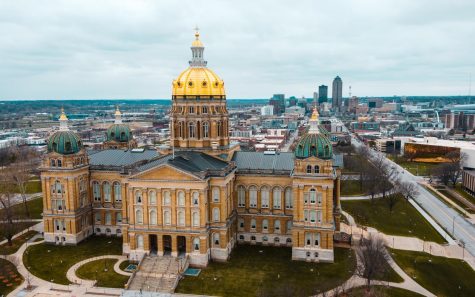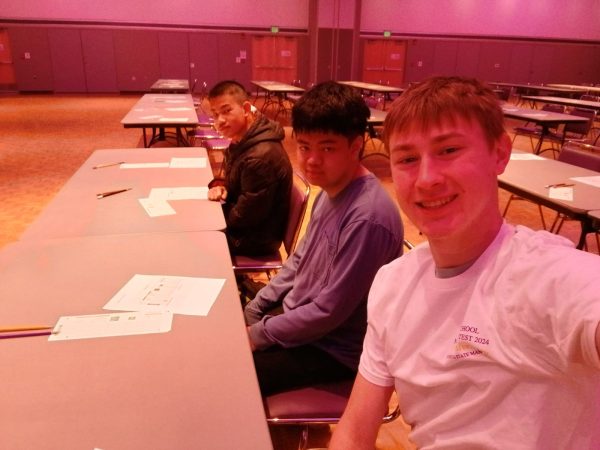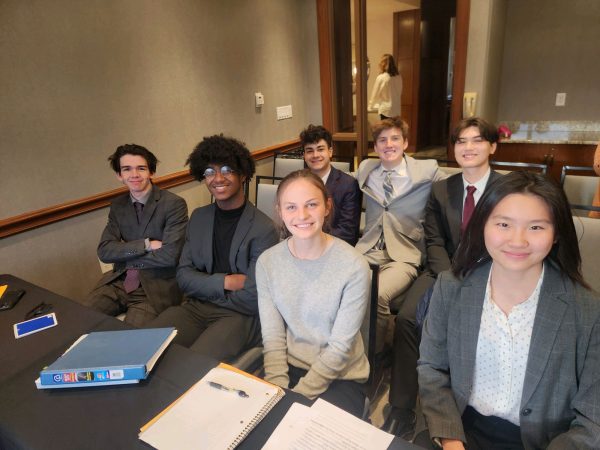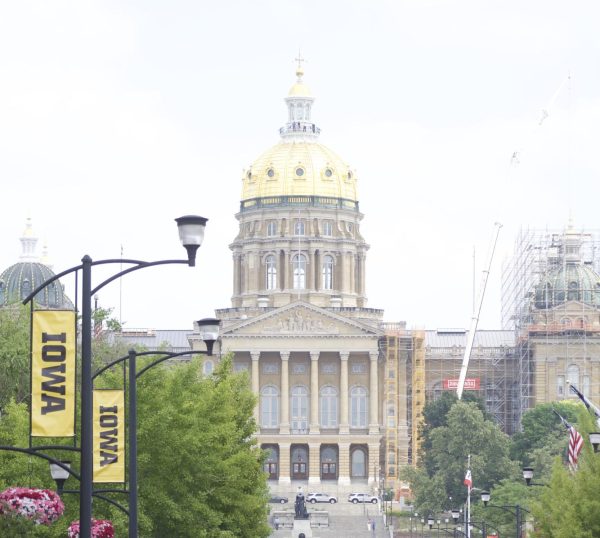State law debate
Students give their opinions on recent state laws and how these laws relate to local control.
Since the start of 2021, several laws have passed in Iowa, including laws that ban masks mandates, require that students have an opportunity to say the Pledge of Allegiance and forbid diversity training. Feeling the impacts of these laws first-hand, West High students and teachers have their fair share of opinions on the latest state legislation.
Mask mandate ban
When students first returned to school, House File 847 prevented mask mandates from being enforced. However, a federal judge granted a temporary restraining order which allowed the school board to reinstate the mask mandate in Iowa City schools. The lawsuit that resulted in this change was about how it affected children with disabilities, who are more likely to be immunocompromised, yet still have a right to free, public education. If going in-person helps a student learn best then they should have the right to do so. The Supreme Court had previously ruled that denying school-aged children a free public education violates the Constitution, so the judge enacted the pause of this portion of HF 847.
Also, as of print time, the Department of Education’s Office of Civil Rights opened an investigation in five states, including Iowa, for their mask mandate ban Aug. 30, again addressing that the laws discriminate against students with disabilities and students who have a high risk of severe illness from COVID-19.
When the state forbade mask mandates in May, Zach Barton ’23 believed the ban was inconsiderate of public health.
“To make a decision that would forward your agenda but cost the lives of your constituents is a very bad idea to me,” Barton said. “You’re not proving anything except for the fact that you are willing to sacrifice people’s lives that you deem unimportant to make sure that your agenda gets pushed.”
Miles Mohamed ’24 believes wearing a mask respects others who have lost family to COVID-19.
“I’m vaccinated; I’ve had both my doses. Even with those doses, I still wear my mask to keep myself safe, to keep my family safe and to honor those who have lost their loved ones to COVID — it would be a slap in the face to not wear a mask at school when there are people who’ve lost their family members to COVID,” Mohamed said. “It’s just a bad idea overall, allowing the state to override anything that is going on locally.”
Pledge of Allegiance law
House File 415, passed by the House Feb. 16, requires all Iowa public schools K-12 to offer an opportunity for students to recite the Pledge of Allegiance each day and have an American flag displayed in every classroom. At West High, a recording of Principal Mitch Gross reciting the Pledge of Allegiance plays every day after the first bell.
Ethan Titus ’22 participates in the Pledge of Allegiance every morning. For Titus, reciting the Pledge is a way to honor the U.S.
“I stand because I believe the Pledge of Allegiance is a great opportunity to take a minute just to show appreciation for our country. The Pledge was created to unite us and celebrate our freedom,” Titus said. “My parents and grandparents grew up reciting the Pledge in school, and I think it’s important to carry on that tradition in order to recognize how lucky we are to live in the United States.”
Barton recalls reciting the Pledge of Allegiance in elementary school, but as they became more educated about the history of the U.S., their opinions about the Pledge changed.
“I didn’t think very much of it at the time, but now that I’m in high school and I’ve taken history classes that haven’t been from a Eurocentric standpoint, I’m glad they included the clause that if the students don’t want to, they don’t have to because I don’t think I can cheer for a country that’s done what it has,” Barton said.
Conversely, Sierra Bertelli ’24 feels this law is useful as a means of education.
“I feel like it’s a good law because it teaches younger kids about how they are a part of this country, and how they can represent themselves,” Bertelli said.
Bertelli also believes that this law is beneficial and should have existed sooner. She also acknowledges that there are plenty of reasons people may not want to participate in the Pledge of Allegiance.
“I do understand that people may not like this country for their own reasons, though, we are living in America. I do feel like [we should] have the Pledge of Allegiance because we fought for our country,” Bertelli said.
Anthony Allou ’23 believes choosing to recite the Pledge or not is the choice of each individual.
“I think, if you want to, you can, if you don’t want to, that’s fine. It’s entirely a matter of freedom of speech,” Allou said. “I think that if somebody wants to say it, I’m glad that they have their time to pledge their allegiance if somebody doesn’t want to say it, I’m glad it’s not required.”
Diversity training
Gov. Kim Reynolds signed House File 802 into law June 8, prohibiting public schools K-12 from teaching that the Iowa or the U.S. is systemically racist. This legislation also bans implicit bias training, something all district teachers do where they reflect on their actions in the classroom to ensure fairness and equity in decision making.
According to English teacher John Cooper, implicit bias training is vital for white teachers to recognize their unconscious discrimination.
“It was a lot of reflection. It was a lot of evaluating. Is there a discrepancy between how I grade my students of color and my white students? Absolutely. I sat down and looked at those numbers without anybody prompting me … because that’s a big part of what we’ve been looking at with our literature, too,” Cooper said. “We need to think about things from other perspectives before we decide that our perspective is the best perspective,” Cooper said.
Mohamed believes this bill ignores U.S. history.
“That’s something that needs to be taught, that’s something that has happened in America countless times and it’s even been part of America’s history,” Mohamed said. “You can’t just completely cut it out and act like it doesn’t exist.”
Paige Nierling ’23 echoes these sentiments.
“You’re supposed to teach the facts, and the facts are that [America] is very segregated and the whole system was built that way. It’s just ridiculous,” Nierling said. “If you’re gonna teach, you’re going to want to teach the proper way — you’re going to want to teach everything. If you’re going to ban it, there’s no sense in even teaching at all.”
Overall, Cooper believes there are two sides to this argument of state or local control of education.
“There’s my personal belief that education is inherently personal and that the state should not be able to tell any of us where or when we learn and what we’re learning,” Cooper said. “However, the tricky part about education is, even though it is a state issue, there are still overarching federal expectations that we have to meet.”
Your donation will support the student journalists of West High School. Your contribution will allow us to purchase Scholarship Yearbooks, newsroom equipment and cover our annual website hosting costs.

(she/her) Hanah Kitamoto is a senior at West. This is her third year on staff and she is the Print Co-Editor-in-Chief with Kailey Gee. She enjoys meeting...

(she/her) Ginger McCartney is currently a senior at West, this is her third year on staff. She is the art editor for the West Side Story paper. Outside...
















